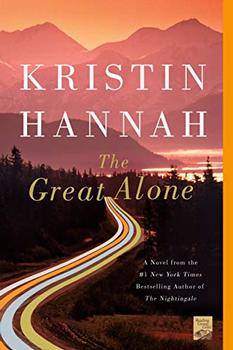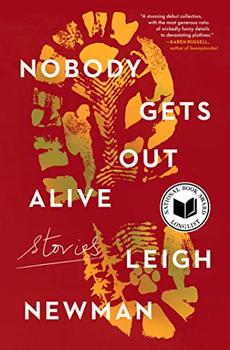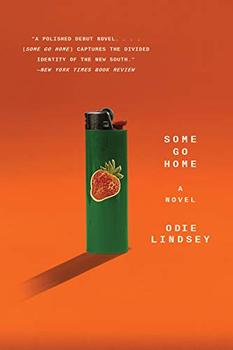Summary | Excerpt | Reading Guide | Reviews | Beyond the book | Read-Alikes | Genres & Themes | Author Bio

Kristin Hannah's The Great Alone, centers around Leni Allbright, a teenage girl who moves with her parents to the remote wilds of Alaska in the 1970s. Her father, a Vietnam veteran, feels that the isolation of the rugged wilderness will give him a new lease on life and provide healing, and plans to establish a homestead with his family far from society. However, Leni soon find that their seclusion, the challenges of living in such a remote area, and the unending nights ultimately release her father's demons instead.
The Great Alone definitely has its strengths, and there's much to enjoy here. For me, the author's writing is the highlight. Her ability to describe the beauty of the harsh Alaskan country is perhaps the novel's best feature; her prose made me long to visit the area.
Even with all the pictures Leni had studied and all the articles and books she'd read, she hadn't been prepared for the wild, spectacular beauty of Alaska. It was otherworldly somehow, magical in its vast expanse, an incomparable landscape of soaring, glacier-filled white mountains that ran the length of the horizon, knife-tip points pressed high into a cloudless cornflower-blue sky. Kachemak Bay was a sheet of hammered sterling in the sunlight. Boats dotted the bay. The air smelled briny, deeply of the sea. Shorebirds floated on the wind, dipped and rose effortlessly.
I frequently caught myself smiling at her turn of a phrase, such as a character warning Leni and her mother that "Alaska herself can be Sleeping Beauty one minute and a bitch with a sawed-off shotgun the next." The family's efforts to transform a broken-down hovel into a home in which they could survive the unforgiving northern winter are fascinating as well. And the action scenes distributed throughout had me on the edge of my seat more than once.
There are, however, aspects of the novel that don't live up to the quality of the author's writing. First, with the exception of Leni, the characters are all completely flat; they are stereotypical with absolutely no growth over the course of the novel. They are people we have often encountered in literature – the battered wife, the all-wise woman who looks out for her, the damaged POW, the iconoclastic anti-government patriarch, etc. There's nothing new here.
I also found the plot somewhat uneven, at times being overly predictable and at others taking improbably twists that challenge credulity. The author starts to develop plotlines but later they're mysteriously dropped (in one example, several times she mentions a brooding boy about the same age as her protagonist but then he disappears from the narrative entirely; in another, an ultra-conservative conclave that seems central in the first chapters inexplicably plays no role as the book progresses). And finally, the last section felt rushed and under-developed.
Although I found The Great Alone to be a mixed bag, I imagine Hannah's fans will be able to overlook the book's flaws and enjoy both the beauty of her prose and the romance at the core of the story. Book groups may also find the novel to be a good selection leading to in-depth discussions of important issues such as spousal abuse, the treatment of returning war veterans, and the tussle between progress vs. tradition.
![]() This review was originally published in The BookBrowse Review in February 2018, and has been updated for the
October 2019 edition.
Click here to go to this issue.
This review was originally published in The BookBrowse Review in February 2018, and has been updated for the
October 2019 edition.
Click here to go to this issue.

If you liked The Great Alone, try these:

by Leigh Newman
Published 2023
From the prizewinning, debut fiction author: an exhilarating virtuosic story collection about women navigating the wilds of male-dominated Alaskan society.

by Odie Lindsey
Published 2021
A searing debut novel that follows three generations - fractured by murder, seeking redemption - in fictional Pitchlynn, Mississippi.
Being slightly paranoid is like being slightly pregnant – it tends to get worse.
Click Here to find out who said this, as well as discovering other famous literary quotes!
Your guide toexceptional books
BookBrowse seeks out and recommends the best in contemporary fiction and nonfiction—books that not only engage and entertain but also deepen our understanding of ourselves and the world around us.